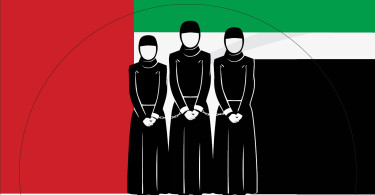After posting a tweet that said “I miss my brother,” UAE security forces summoned Asma Khalifa al-Suwaidi and her two sisters to a police station on 15 February 2015. They were not seen or heard from for three months.
Prior to their disappearance, the sisters peacefully campaigned on Twitter for the release of their brother, Dr. Issa al-Suwaidi, who received a ten-year prison sentence in July 2013. He is one of the UAE 94, a group of prominent human rights defenders, judges, academics, and student leaders tried en masse by the UAE government in 2013 for their peaceful criticism of the government. Days before their disappearance, Mariam, Alyaziyah, and Asma questioned the legality of their brother’s trial on Twitter. Asma tweeted, “I searched and I did not read in my brother’s case any reasonable argument leading to his isolation and imprisonment that is depriving him of life for 10 years.” Five days later, security forces summoned the sisters.
The authorities finally released the women in May 2015, exactly three months after they were detained. The police never publicly acknowledged any official charges or released information on the reasons behind their detention. Families of political prisoners face similar persecution in the UAE for advocating on behalf of their jailed relatives. Since 2013, UAE authorities have harassed, arrested, and intimidated relatives of the UAE 94, such as Osama al-Najjar, who was imprisoned for tweeting about his father’s ill treatment in prison. Amnesty accused UAE authorities of “showing utter disregard for free speech and for those activists who peacefully stand up for their rights and those of their loved ones.”
Enforced disappearance is a crime under international law. When prisoners are held in secret detention, they are extremely vulnerable and are at high risk of torture and other ill treatment. Article 5 of the 2006 International Convention on the Protection of All Persons Against Enforced Disappearances states that “the widespread or systematic practice of enforced disappearance constitutes a crime against humanity as defined in applicable international law and shall attract the consequences provided for under such applicable international law.” The UAE has yet to sign or ratify the convention.
Shelby Jamerson is an advocacy intern at ADHRB.
اضغط هنا للقراءة بالعربية





